Master Franchise: Key Strategies for Adapting a Concept to a New Market
Master franchising is a powerful strategy for expanding businesses internationally. By granting the master franchisee the rights to develop an established franchise in a new market, franchisors can tap into untapped regions. The master franchisee benefits from a proven business model while adapting it to the specific conditions of the local market. However, achieving success requires strategic planning, careful adaptation, and a deep understanding of local dynamics, all while maintaining the brand’s core identity.


Comprehensive Market Analysis
The first step in adapting a franchise to a new market is conducting a thorough market analysis. Success hinges on understanding the local consumer base, including their cultural preferences, spending habits, and lifestyle choices. Markets differ greatly: a franchise that flourishes in one region may face different expectations elsewhere. For example, products that resonate in Western markets may need adjustments in Asian or African contexts. Anticipating these differences helps the master franchisee tailor the franchise to meet local needs while overcoming potential challenges.
A vital part of this analysis is evaluating the competitive landscape. Understanding the strengths and weaknesses of local competitors allows the franchisee to identify opportunities for differentiation. A solid competitive analysis helps inform product modifications and shape marketing strategies, ensuring the franchise stands out in the market.
Product and Service Adaptation
After understanding the market, the franchise’s offerings may need to be adapted. This is especially important in industries like food services, where cultural and dietary preferences play a significant role. A fast-food franchise, for instance, may need to modify its menu to suit local tastes, such as offering rice-based dishes in Asia instead of bread-based meals. In markets with specific religious dietary requirements, like halal or kosher foods, franchises must align their offerings accordingly. While adapting to local preferences, the franchise must still preserve its brand identity and ensure consistent quality, which is a cornerstone of consumer trust.
Pricing Strategies
Another key consideration is pricing. What works in one market may not be effective in another due to differences in purchasing power and economic conditions. Pricing too high could alienate customers, while pricing too low might devalue the brand. Master franchisees must find the right balance to stay competitive while ensuring profitability.
Navigating Legal and Regulatory Requirements
Understanding and complying with local regulations is critical for a successful market entry. Every country has distinct laws governing business operations, labor standards, consumer protections, and intellectual property rights. The master franchisee is responsible for ensuring that the franchise adheres to these local laws. For instance, employment laws can vary greatly, and labor contracts and working conditions must be compliant. Similarly, product labeling, advertising, and service guarantees must meet local consumer protection standards.
Intellectual property laws are also a significant factor, as the franchise’s brand, logos, and proprietary services must be protected to avoid counterfeiting or misuse. While the franchisor can offer guidance, the master franchisee must ensure full legal compliance.
Localizing Marketing Efforts
Even well-known global brands need to adjust their marketing strategies to resonate with local consumers. This involves tailoring the brand message to reflect local values and preferences, often using local influencers to build credibility. For example, a beauty franchise could collaborate with local bloggers or celebrities to raise brand awareness.
Social media marketing also requires localization. Different countries favor different platforms: while Facebook and Instagram may dominate in one market, others, like WeChat or VKontakte, may hold more influence elsewhere. Knowing which platforms are popular with the local audience is essential for maximizing the brand’s visibility.
Traditional marketing methods also play a crucial role in building local presence. Partnering with local businesses or sponsoring events can establish credibility and trust with potential customers. These efforts should align with the franchisor’s global strategies to maintain brand consistency across regions.
Collaboration Between Franchisor and Master Franchisee
The success of a master franchise depends heavily on the relationship between the franchisor and the master franchisee. This partnership should be built on mutual trust, open communication, and ongoing support. The franchisor provides training, resources, and operational guidance, but support shouldn’t end after the launch. Continuous assistance is vital to ensure that the master franchisee remains aligned with any updates or changes in the business model.
Regular communication helps address challenges and adapt to evolving market conditions. The master franchisee provides the franchisor with valuable local insights, informing future expansions and adjustments in similar regions.
Localizing Management Practices
One often overlooked aspect of market adaptation is adjusting management practices to align with the local business culture. From how employees are managed to how customer service is delivered, these cultural nuances can significantly impact daily operations and the franchise’s overall success. In some regions, a hierarchical management style might be expected, while in others, a more collaborative approach is preferred.
Agility and Adaptability
The ability to adapt quickly to changing market conditions is crucial for long-term success. Consumer preferences, economic trends, and local regulations can shift rapidly, and the master franchisee must be flexible in response. Whether introducing new products, refining marketing efforts, or adjusting operations, staying agile ensures that the franchise remains competitive and relevant.
Conclusion
Master franchising offers a unique opportunity for both franchisors and master franchisees to expand into new markets. However, success requires careful planning, local market understanding, and maintaining brand consistency. By conducting thorough market analysis, adapting offerings, navigating legal challenges, and fostering strong collaboration with the franchisor, master franchisees can successfully introduce and grow the franchise in a new region. Flexibility, ongoing communication, and a long-term commitment are key to thriving in an unfamiliar market.
About the Author :
Business lawyers, bilingual, specialized in acquisition law; Benoit Lafourcade is co-founder of Delcade lawyers & solicitors and founder of FRELA; registered as agents in personal and professional real estate transactions. Member of AAMTI (main association of French lawyers and agents).
FRELA : French Real Estate Lawyer Agency, specializing in acquisition law to secure real estate and business transactions in France.
Paris, 19 Rue du Colisee, 75008 Paris
Bordeaux, 24 Rue du manège, 33000 Bordeaux
Lille, 40 Theater Square, 59800 Lille

This article is provided for general information only and may not reflect the most recent legal or tax developments. It does not constitute legal advice. Please contact us for personalised guidance before making any decision.




